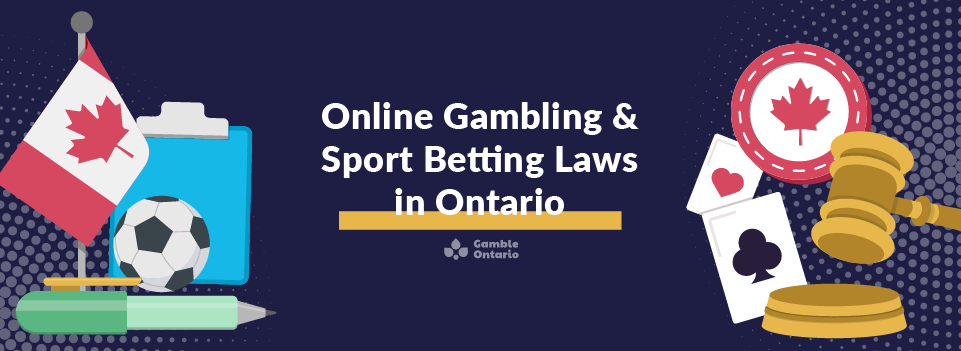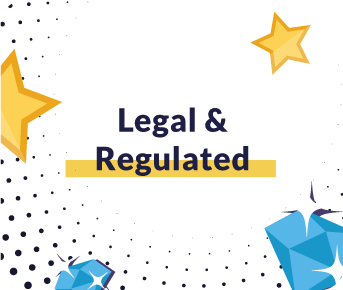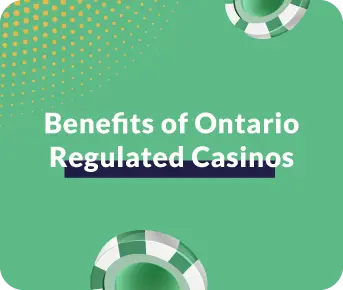Ontario Online Gambling & Sports Betting Laws
Over the past few years, the online gaming industry in Ontario has experienced a significant transformation, starting in 2022 with the launch of the province’s online gaming market, which allowed bettors to place wagers online legally.
For your convenience, we have created a timeline of all the important milestones since the launch of the Ontario iGaming market in 2022.
- We have gathered all the information related to regulations for Ontario’s online gambling platforms in a reader-friendly manner on this page.
- We will discuss licensing requirements in detail, including a step-by-step guide to the process involving both regulatory bodies, AGCO and iGO.
- We will provide you with valuable information on gambling taxation and fees for all forms of legal gambling in Ontario.
- We will cover player protection standards set by the regulators and our contribution as a respected affiliate online gambling website to this effort.
- We will address the most frequently asked questions about the legality of online gambling in Ontario.
We invite you to continue reading to gain a comprehensive understanding of the online gambling industry in Ontario and to explore the exciting opportunities it offers.

Timeline of Ontario's Online Gambling Regulations
2022
April
Ontario Launches Online Gaming Market
Ontario launches its online gaming marketplace, allowing bettors across the province to legally place wagers online.
2022
August
Over $4 Billion in Wagers in the First Six Months
Bettors flock to iGaming Ontario, placing over $4 billion in wagers and boosting iGaming operators’ pockets by $162 million.
2022
October
Ontario's Online Gaming Market Hits Warp Speed
Ontario’s online gaming market is accelerating, generating a total handle of over $6 billion.
2022
November
MCK Sues Ontario over New iGaming Market
The Mohawk Council of Kahnawà:ke (MCK) files legal action against Ontario’s Attorney General and iGaming Ontario, alleging an unlawful new market and adverse effects on MCK’s gaming business.
2023
January
iGaming Industry Records Staggering Total of Online Wagers
The Ontario iGaming industry records a staggering total of $11.53 billion in online wagers.
2023
April
AGCO Advocates for New Advertising Rules for iGaming Operators
The AGCO advocates for new advertising rules that could eliminate influencers, celebrities, entertainers catering to youngsters from iGaming ads, and demand operators to purge their marketing material of current and former athletes.
2023
April
Ontario's Online Gaming Operators Record Total Wagers of $13.9 Billion
Ontario’s iGaming websites rake in $13.9 billion in total wagers, catapulting the first-year total to an astronomical $35.5 billion.
2023
July
iGaming Ontario Reports $14.0 Billion in Online Casino Wagers
iGaming Ontario’s Q1 FY 2023-24 report reveals $14.0 billion in online casino bets, with 83% of wagers and 72% of revenue from online casino games, 14% from sports betting, and 3% from poker.
2023
July
AGCO appoints new Board Chair and CEO
AGCO appoints Dave Forestell as Board Chair, and Dr. Karin Schnarr as CEO, who will take over from Tom Mungham in September.
2023
August
Heidi Reinhart named iGaming Ontario Chair
Heidi Reinhart becomes iGaming Ontario Chair, succeeding Dave Forestell. She has a legal background that will help develop Ontario’s iGaming market.
2023
September
New Horse Racing Medication Rules by AGCO Delayed
AGCO delays new horse racing medication rules until January 1, 2024.
2023
October
SBC Premieres Documentary on Ontario's iGaming Revolution
SBC premieres a 13-minute documentary on Ontario’s regulated gaming scene, highlighting the province’s position in the global sports betting and online casino arena.
2023
November
iGaming Ontario Plans Centralized Self-Exclusion Platform
iGaming Ontario will launch a centralized self-exclusion platform in 2024, allowing players to self-exclude from all Ontario-licensed operators.
2024
February
Superior Court Reserves Decision on Private-Sector iGaming in Ontario
Superior Court Justice Lisa Brownstone reserves her decision on whether private-sector operators are “conducting and managing” Ontario’s competitive iGaming market. The Mohawk Council of Kahnawake rejects the Ontario government’s claims in a court hearing on the market’s legality. Lawyers for iGaming Ontario defend their regulatory framework.
2024
March
iGaming Ontario Seeks Proposals for Self-Exclusion Platform Development
iGaming Ontario seeks proposals for a centralized self-exclusion solution until May 8, 2024.
2024
April
Money Laundering Warning Issued by FINTRAC
FINTRAC warns of money laundering in unlicensed online gambling sites and drafts indicators for platforms to look out for.

Who Regulates Online Gambling in Ontario
The Ontario Gaming Control Act of 1992, which was last updated in 2020, has laid out the rules that online gambling establishments abide by to keep players safe. This is a legal framework operators need to follow.
Online casino sites, and sport and event betting sites in Ontario must obtain a licence from the Alcohol and Gaming Commission of Ontario (AGCO), ensuring all establishments in the province follow the law.
The commission assesses how trustworthy and transparent operators are, while also making sure they are absolutely dedicated to promoting responsible gambling practices.
Useful Terms & Organizations about Gambling and Licensing in Ontario
Here we list the most important terms that we deem are of immediate importance and value to you. If you want to learn more about related terms and organizations along their definitions, we recommend checking Registrar’s Standards for Internet Gaming.
Ontario’s iGaming Regulatory Bodies
Legal Gambling and Sports Betting in Ontario – Terms Explained

What Are The Licence Requirements in Ontario?
To legally operate an online casino in Ontario, operators need licences from two regulating bodies: iGaming Ontario (iGO) and the Alcohol and Gaming Commission of Ontario (AGCO).
These licences ensure operations are safe and legal for players.
The iGO process includes:
- Signing an NDA
- Agreeing to a letter of agreement
- Setting up secure channels
- Submitting AML and financial information
- Joining iGO’s readiness cycle
- Finalizing an operating agreement
The AGCO process involves:
- Certifying games with an ITL
- Registering with AGCO
- Implementing compliance controls
- Gaming notification training
- Setting up iAGCO reporting
- Configuring AGCO secure access
- Confirming tech compliance
The time frames for each step vary depending on each operator’s individual circumstances.
Are Gambling Winnings Taxable in Canada?
In Canada, gambling winnings are generally subject to taxation, but there are some exceptions.
For instance, recreational gambling winnings in Ontario are exempt from tax.
However, if you are a professional gambler, you must report your winnings to the Canadian Revenue Agency (CRA) for income taxation.
The CRA assesses whether gambling income is taxable by considering different factors, such as:
- the extent of profit-focused organization in the gambler’s activities,
- previous access to gambling courses or skill training, and
- the frequency of gambling activities.
Lottery winnings, on the other hand, are not taxed in Canada, but any interest earned on them is taxable.
Similarly, sports betting winnings are also non-taxable in Canada, except for professional gamblers, who must declare their winnings to the CRA for income taxation.
What Measures Do Ontario Regulators Take to Protect Players?
Gambling can be a fun and exciting activity, but it’s important to prioritize responsible gambling practices.
In Ontario, various gambler/bettor protection measures are in place to ensure a safe and fair gaming environment for all.
1️⃣ One key measure is the option for players to take a break from play or enroll in a self-exclusion program. This allows individuals to take a step back and reassess their gambling habits if they feel they may be at risk of developing a problem.
2️⃣ In accordance with the regulations set forth by the Ontario Gaming Commission, all operators holding a valid licence are obligated to ensure that their casino, poker, bingo, sports betting, and/or betting exchange products are readily accessible to players. This includes prominently promoting these programs and providing clear and concise terms and conditions to ensure transparency and fairness.
3️⃣ Operators are expected to maintain streamlined registration processes that are efficient and user-friendly, allowing players to easily access these services.
4️⃣ Another important protection measure is the ability for players to set limits on their gambling activity, both in terms of finances and time. Operators must provide easy and obvious ways for players to set deposit and loss limits, with options for time periods ranging from 24 hours to one month. If a player requests to relax or eliminate a previously established limit, a cooling-off period of at least 24 hours must be enforced before any changes are made.
5️⃣ Operators are required to take active steps to identify and remove self-excluded individuals from their gaming sites and prevent marketing or promotions from being sent to them during their exclusion period. Any unused funds in a self-excluded individual’s account must be returned upon request.
These measures aim to minimize potential harm and promote a responsible gaming environment for all players in Ontario.
How Do We Contribute to Player Protection?
At GambleOntario, we take our responsibility to contribute to a safe gambling environment seriously.
We firmly believe that gambling should be enjoyable only when practiced responsibly and within one’s control limits.
We have implemented several practical measures to ensure the safety of our readers who are of legal age (19+) and eligible to gamble online according to the Registrar’s Standards for Internet Gaming.
Here’s what we do:
1️⃣ We refrain from listing gaming sites that operate in Ontario without an AGCO licence.
2️⃣ We don’t use language that may encourage underage or vulnerable individuals to gamble online.
3️⃣ We have a dedicated Responsible Gambling section that provides valuable resources and information on the subject, including links to AGCO’s Responsible Gambling page.
4️⃣ We have a Player Rights page that we strongly advise all our readers to consult before signing up at an online gambling site, be they new players or experienced ones.
5️⃣ We are always available to our readers and especially sensitive to topics related to responsible gambling. Therefore, we keep our communication channels open and are always ready to offer assistance and guidance whenever required, directing you to the appropriate helplines and resources to help resolve any issues or queries you may have.
6️⃣ We offer informative resources and articles on understanding the risks of gambling and tips for staying in control. We take game integrity seriously and detail measures taken to ensure it, such as random number generation certification and regular audits.
7️⃣ We value player feedback and use it to improve our responsible gambling efforts and user experience continuously.
Whenever you’re looking to play online games or bet on sports, keep an eye out for the iGaming Ontario logo.
If you see it, it means that you’re playing on a site that is being managed by iGaming Ontario and meets Ontario’s high standards for responsible gambling and game integrity.
This way, you can be confident that you’re playing on a safe and secure platform.
FAQs About Online Gambling & Sports Betting Laws in Ontario
Is online gambling legal in Ontario?
Yes, online gambling is legal in Ontario. The province has established a framework to regulate online gambling operations, allowing companies that meet specific criteria and obtain the necessary licenses to offer their services legally to residents.
Who governs online gambling in Ontario?
The Alcohol and Gaming Commission of Ontario (AGCO) governs online gambling in Ontario. Additionally, iGaming Ontario (iGO), a subsidiary of AGCO, operates as the conduct and manage entity overseeing the province’s online gambling market.
When did online gambling become legal in Ontario?
Online gambling has been legally available in Ontario through the Ontario Lottery and Gaming Corporation (OLG) for several years. However, a significant shift occurred on April 4, 2022, when Ontario launched its open and regulated internet gaming market, allowing licensed private operators to enter the market.
What is considered illegal gambling in Ontario?
Illegal gambling in Ontario includes any gambling activity not licensed or regulated by the province’s legal framework. This can encompass unlicensed online gambling operations, underground betting establishments, and any form of gambling that violates provincial regulations.
Is online gambling taxed in Ontario?
In Ontario, gambling winnings are generally not subject to taxation unless considered to be income from a business. For the average player, winnings are not taxed. However, operators and gaming entities are subject to regulatory fees and taxes as part of their licensing agreements.
References
The information provided on this page is sourced only from reliable and authorized sources.
Ontario Gambling Licence
Gaming Control Act, 1992, S.O. 1992, c. 24
Steps To Joining the Ontario Market | Alcohol and Gaming Commission of Ontario
Steps to Join the Ontario Market | iGaming Ontario
Casino Gaming Registration Fees | Alcohol and Gaming Commission of Ontario
Brief Report: The Rise of Online Betting in Ontario | Journal of Gambling Studies
Legal Gambling Age
Eligibility – Alcohol and Gaming Commission of Ontario | AGCO
The Legal Age for Casino Gambling Around the World | BetMGM
Taxable Winnings from Gambling in Canada
Are Gambling Winnings Taxable in Canada? | Roses and Associates Tax and Law


